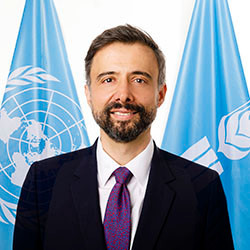World Food Day
IFAD Asset Request Portlet
ناشر الأصول
Today, on World Food Day, I would like to bring your attention to the 3 billion people who depend on the world’s 500 million small-scale farms for their daily food.
For too many years the global community has left rural people behind. Financing, social services, electricity, and even paved roads do not reach remote rural areas.
Small-scale farmers earn only 6.5 cents for every dollar of food they produce. And they receive less than 2 per cent of global climate finance.
Even before the COVID-19 pandemic, before the war in Ukraine, and the droughts, floods and heatwaves that have been making headlines all year, around 800 million people were going hungry.
Most live in the remote rural areas of developing countries.
Today’s food crisis has many roots: in broken global food systems; in glaring inequalities; and in an instinctive response to every crisis that prioritizes the short-term – but does not follow through with long-term investments to build the resilience of those who need it most.
We do what is immediately necessary. But we don’t do what is strategic, far-sighted, and ultimately sustainable.
This year, more than ever, World Food Day should be a call to ramp up action to help those who supply food to their communities and countries -- through crisis after crisis – despite inequality, vulnerability, and poverty.
We can break the cycle of poverty and hunger, but it requires time, effort and long-term investment by donor countries, developing nations and development partners alike, including the private sector. Not just as a way out of the present crisis but as the way to a sustainable and resilient future.
The return on this investment justifies the efforts – less poverty, better nutrition, economic growth, human dignity, fewer conflicts, and an end to the desperation that forces people to abandon their homes, migrate, or even take up arms.
So today, let us commemorate World Food Day by committing to world that no longer leaves rural people and small producers behind.
